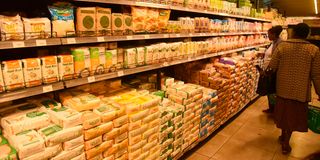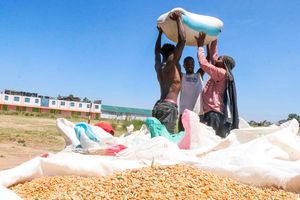
Customers countercheck the prices of maize flour at a supermarket in Nakuru City on April 19, 2023.
Households have been forced to raise the budget for maize flour, a staple, by double-digit rates in five months on falling supply of the grain, shining the spotlight on President William Ruto’s projection of a bumper harvest last crop season.
Flour millers have attributed the renewed upward price pressure on unga as it is best known, to falling domestic supplies, prompting them to rely on imports from Tanzania.
A two-kilogramme packet of fortified maize flour was retailing at an average of Sh165.05 in March, an analysis of data collated by the Kenya National Bureau of Statistics shows-- the highest levels in 13 months.
That price represents a 2.94 per cent rise over February and 14.11 per cent over last October, the official data shows.
“Farmers are holding minimal stock [of maize grain], while traders are speculating on price increases,” Paloma Fernandes, chief executive of Cereal Millers Association (CMA), told us via email.
“[Animal] feed millers are competing for the same maize supply as no waiver has been gazetted for imported feed maize, further increasing demand.”
Growing demand amid thinning supply has pushed up the cost for a 90-kilogramme bag of maize as much as 26.47 per cent compared with last December, the millers said.
Farmers in Eldoret, for instance, are selling maize for between Sh4,250 and Sh4,300 per 90 kilogramme bag compared with a range of Sh3,400 to Sh3,500 for the same quantity last December.
CMA said the rise in flour prices is proportionate to the increase in the cost of production largely driven by the cost of maize grain, meaning millers are passing on the bulk of the extra cost to consumers.
This comes months after Dr Ruto exuded confidence that the country was on track to achieving stability in the domestic food supply, citing subsidies on farm inputs such as fertiliser and seeds, which have raised output to “record levels”.
“Our efforts to secure food security and stability are already bearing fruit. Since February, we have distributed subsidsed fertiliser to 6.45 million registered farmers in 45 counties, enabling them to increase their yields.
This year [2024] we have procured and through e-vouchers distributed 7 million bags of both planting and top dressing fertilizer to boost food production across the country,” Dr Ruto said last November during his annual State of the Nation Address.
“This intervention will see a projected increase in maize production to a record of 74 million 90 kg bags.”
Attainment of that output would mean a 55.46 per cent jump over 47.6 million bags in 2023. Indications in the market, however, point to reduced supply compared with last year.









